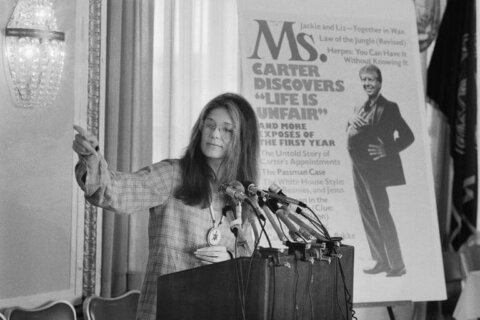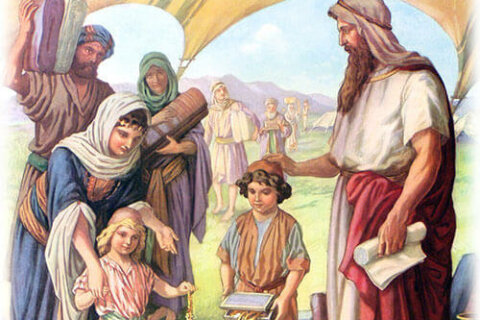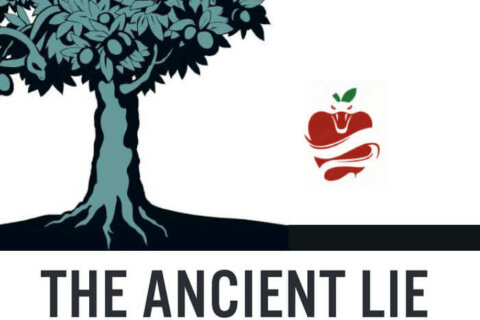The Promise of Abraham
From Adam to Noah to Abraham and the patriarchs, God’s promise was passed down from generation to generation: a Chosen Seed would come; the serpent would be crushed; the world would find redemption from the curse. Then God made His covenant with Abraham: he would become the father of many nations, and God’s promised seed would come through his progeny.
The law (with its animal sacrifices, its ordinances, and tabernacle) as revealed to Moses, did not come until four hundred thirty years later. It is vital to note that the promise of Abraham was never contingent upon the law, for it preexisted the law and the temple. The law, as clearly stated by Paul to the Galatians, had a temporary function. It was not everlasting. It was but a “schoolmaster” (in the Greek, a servant who delivered a child to school) with the assignment of bringing Israel to the place where they could receive Christ.
When Israel arrived at this appointed inheritance, the law would reach its expiration date and vanish (Gal. 3:17, 19). The law was never completely adequate to fulfill their needs (Heb. 7:19). It fell short of the full prophetic standard–redemption for all nations.
Time and again, Israel transgressed God’s law and fell into the ways of the pagans around them (Isa. 65:2-3). God sent His prophets to remind them of the covenant, foretelling a time when the Messiah would come to restore a multi-national Israel, an Israel populated by Gentiles (Isa. 54:2-3; 65:1); an Israel through whom all the nations of the earth would be blessed.
This Messiah would reign for ever on David’s throne. And His ultimate sacrifice would put an end to animal sacrifices (Dan. 9:27). The whole world waited for the Messiah.
Who Is the Promised Seed?
Who, then, would inherit the promise of Abraham? Paul answers us very explicitly: “Now to Abraham and his seed were the promises made. He saith not, And to seeds, as of many; but as of one, And to thy seed, which is Christ” (Gal. 3:16).
Christ was whom Abraham looked forward to (John 8:56); and belief in Christ, the promised Abrahamic seed, was what characterized the household and lineage of Abraham. “For ye are all the children of God by faith in Christ Jesus. And if ye be Christ’s, then are ye Abraham’s seed, and heirs according to the promise” (Gal. 3:26, 29). This faith was what differentiated between Nathanael, whom Jesus declared an Israelite indeed (John 1:47), and the Pharisees, whom Jesus said were not children of Abraham although physically qualified (John 8:39-40). Upon this ground, Paul could disqualify those as Jews who were Jews outwardly, but could accept into the Jewish lineage those who were circumcised in heart (Rom. 2:28-29).
Faith replaced the law with Christ: “But before faith came, we were kept under the law, shut up unto the faith which should afterwards be revealed…But after that faith is come, we are no longer under a schoolmaster” (Gal. 3:23, 25). Whoever had the faith of Abraham was a child of Abraham (Rom. 4:9-12).
Will the Temple Be Rebuilt in Jerusalem?
Scripture refers to two distinct cities of Jerusalem–one the physical location familiar to Jewish history, and the other a heavenly place (Gal. 4:25-26). There is no doubt that prophecy must be fulfilled; but if we limit its fulfillment to the literal Jerusalem, we take a different attitude than did Jesus, who assured the Samaritan woman that God was not seeking worshippers who will serve Him in Jerusalem, but those who will worship Him in Spirit and in truth (John 4:21-24). Jesus preached a kingdom which would not be limited to a certain location, but would be universal in the hearts of believers (Luke 17:20-21), and He scandalized the Jewish leaders by telling them He would raise up a temple in three days, a temple which, although they struggled to comprehend its full significance, they correctly understood to be different from the temple Herod had built.
New Testament writers understood that Christ had replaced the earthly temple with a heavenly sanctuary (Hebrews chap. 9 and 10), and described that sanctuary as God’s people, His cleansed temple in which He dwells (1 Cor. 3:16-17; 6:19). They believed themselves to stand within the fulfillment of prophecy, having already come to God’s heavenly Jerusalem, His church (Heb. 12:22-24).
Will Animal Sacrifices Be Reinstated?
If so, it would be against the will of God. “Above when he said, Sacrifice and offering and burnt offerings and offering for sin thou wouldest not, neither hadst pleasure therein; which are offered by the law; Then said he, Lo, I come to do thy will, O God. He taketh away the first, that he may establish the second.” (Heb. 10:8-14).
Animal sacrifices never could take away sins. Christ offered Himself as the perfect sacrifice. There is no need for any other.
Will Israel Regain the Promised Land?
Promises of the literal land belonging to Israel for ever must be understood in light of the original wording, which signifies not for ever as in eternity, but simply for ever as in, as long as something endures. And remember, Israel as a special people, along with the Mosaic law, had but a temporary function.
What About the Everlasting Covenant with David?
The covenant is everlasting because Christ, the Everlasting, is the embodiment of the covenant. David’s throne will endure forever because Christ, the Eternal King, rules upon it without end. “For unto us a child is born, unto us a son is given: and the government shall be upon his shoulder: and his name shall be called Wonderful, Counsellor, The mighty God, The everlasting Father, The Prince of Peace. Of the increase of his government and peace there shall be no end, upon the throne of David, and upon his kingdom, to order it, and to establish it with judgment and with justice from henceforth even for ever.” Isaiah 9:6-7.
Will Israel Be Saved?
There will be a remnant saved according to the election of grace (Rom. 9:27; 11:25). But there will also be those who stumble at the stumblingstone, not attaining righteousness because they seek it by the works of the law rather than by faith in Christ (Rom. 9:32). Those who are saved…will recognize Christ as the end of the law for righteousness (Rom. 10:4). “For I would not, brethren, that ye should be ignorant of this mystery, lest ye should be wise in your own conceits; that blindness in part is happened to Israel, until the fulness of the Gentiles be come in. And so [in this manner: that is, through Christ and His gospel, operating through the fulness of the Gentiles] all Israel shall be saved: as it is written, There shall come out of Sion the Deliverer, and shall turn away ungodliness from Jacob” (Rom. 11:25-26).
Shadow vs. Substance
The law was what New Testament writers called a shadow, a kind of placeholder for something bigger to come. “Let no man therefore judge you in meat, or in drink, or in respect of an holyday, or of the new moon, or of the sabbath days: Which are a shadow of things to come; but the body is of Christ” (Col. 2:16-17). “For the law having a shadow of good things to come, and not the very image of the things, can never with those sacrifices which they offered year by year continually make the comers thereunto perfect” (Heb. 10:1). A shadow is the shaded silhouette which light produces on a surface when shining from behind a body or substance. It is the outline of a substance, a representation of the shape of that substance, but it is not the substance itself.
There is much more to the reality of the object that the shadow cannot represent because it fails in depth and substance.
Christ was the substance of prophecy. Of this, the New Testament writers were convinced. Every prophecy met its fulfillment in Him (Matt. 5:17). By arriving on the scene as the substance of God’s plan, He effectively did away with the shadow. The ordinances of the law had but shadowy value in the face of the full glory of the fulfillment. “For there is verily a disannulling of the commandment going before for the weakness and unprofitableness thereof. For the law made nothing perfect, but the bringing in of a better hope did; by the which we draw nigh unto God” (Heb. 7:18-19).
To go back to the Mosaic system would be to go back to try to replace the fulfillment of substance with a mere shadow. It would be comparable, as one preacher quipped, to waiting for your wife to arrive at the airport, and when you see her, rather than embracing her, you run to embrace her shadow. Onlookers would have good cause to question your mental competence. You may have been in love with the shadow when the shadow was all you had, but to long to reinstate the shadow when you have the perfection of the substance would be ridiculous.
Conclusion
The thought that the church age has been an interruption of God’s plan for Israel or that the prophetic clock has somehow been stopped to resume in some future dispensation, can only come through a complete misreading of the New Testament. The whole reason the Jews rejected Christ was that He didn’t fit their literal vision of prophecy. Had Christ wanted a literal temple, literal sacrifices, or a literal throne in a literal Jerusalem, the Jews would have had no reason to oppose Him.
Prophecy was bigger than the Jews had ever imagined. The prophetic clock never stopped–nothing and nobody can stand in the way of prophecy–but the Jews refused to move with it. The clock has kept on ticking, the promises have kept being fulfilled, the kingdom has kept increasing; but prophecy has moved on the feet of Gentile children of Abraham.
God has the power to do anything He chooses. It is no great thing with Him to cause the temple to be rebuilt or to reinstate animal sacrifices. But that would be prophecy going backward. It would be replacing that which is more glorious with that which is less glorious, that which has been done away. God does not wish to operate from a temple in Jerusalem. He does not want a Levitical priesthood or animal sacrifices. The priestly office is already filled (Heb. 9:11). The ultimate sacrifice has already been made (Heb. 9:12; Heb. 10:12-14). The throne of David is already occupied (Heb. 1:8). And the temple of God is already among men, filled with the glory of His power (Heb. 12:22-23).





